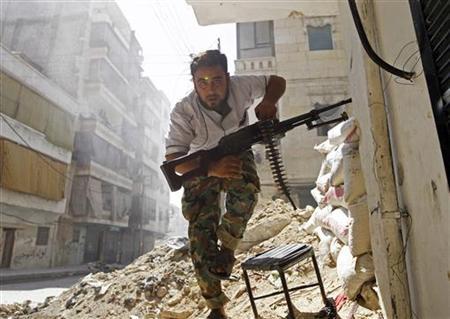
There are three options for using force against a sovereign state. First, the 1945 United Nations Charter prohibits the use of force against a sovereign state but the Security Council can authorise a strike after all peaceful means are exhausted.
The Security Council can do this only if it has determined that there is a threat to peace, breach of peace or act of aggression, and it aims to maintain or restore international peace and security. The Security Council has not yet determined that the situation in Syria can be classified as the abovementioned categories of threats and aggression. Therefore, this option is not available.
As an exception to the general prohibition on the use of force, Article 51 allows states to use force in self-defence until the Security Council takes measures for maintaining international peace and security. However, Syria has not attacked any state and therefore, no state can claim the need to act for self-defence.
Consequently, international lawyers have to look into a third option: the responsibility to protect (R2P) to justify military action.
Responsibility to protect is not a settled principle of international law, but an emerging practice. The 2005 General Assembly resolution 60/1 mentioned it, while the 2009 resolution 63/308 decided to continue its consideration.
General Assembly resolutions of this nature are not binding, but are reflective of opinion of those states who vote for them. A very large number of states have supported Resolution 60/1 and it has some weight. Although not every instance is seen as legal, there is evidence of state practice of intervening on humanitarian grounds.
Resolution 60/1 has clearly laid out the contents of R2P and a procedure to be followed for acting on it. Paragraph 138 spells out the responsibility of states to protect its population from the following four crimes: genocide, war crimes, ethnic cleansing and crimes against humanity.
The procedure of resorting to R2P and what it entails is explained in paragraph 139. Countries should first use appropriate diplomatic, humanitarian and other peaceful means through the United Nations, in accordance with Chapters VI and VII of the Charter. If peaceful means are proven inadequate, timely and decisive collective action should be taken under Chapter VII and Chapter VIII through the Security Council and in cooperation with relevant regional organisations.
Therefore, both the Charter and R2P give the Security Council a central role in the use of force against other states and protecting populations.
The alleged use of chemical weapons against civilians in Syria could be seen as a war crime and crimes against humanity and hence, form the basis of a humanitarian argument to justify military action. For this, two points must be established: first, that chemical weapons were used; and that the Syrian government used them. The US secretary of state outlined evidence of the Syrian government using chemical weapons that killed 1,429 people. But the evidence was not revealed, just asserted by John Kerry.
The most appropriate forum is the Security Council for determining these points, not one extremely powerful state. The UN inspectors, who are in the field, will submit their report to the Security Council, and if the use of chemical weapons is established, it is for the Security Council to determine who is responsible.
The US should also submit the evidence to the Council. But given the 2003 Iraq experience, the evidence must be sound. If the Council determines that the Syrian government was responsible, necessary measures, including proportionate military strikes, can be taken. If the Security Council is blocked by a possible Russian veto, states can form a coalition of the willing and take proportionate measures based on humanitarian grounds.
But it cannot be reiterated enough that whether chemical weapons have been used and who are responsible must be determined by the Security Council. Letting a few powerful states to determine these points is too dangerous and would seriously undermine the international legal order.
The author is a senior lecturer in law at the University of Hull, UK.
Published in The Express Tribune, September 1st, 2013.
COMMENTS (11)
Comments are moderated and generally will be posted if they are on-topic and not abusive.
For more information, please see our Comments FAQ






















































@Sexton Blake: Same can be said of you-the same denials,misquotes,and always trying to prove US and world community wrong. You have not even accepted the death of OBL as yet,and you talk of logic and rationality. Ilham surely is something people might get sitting in their home,but the world is not going to accept it as a substitute for truth at hand. US,despite its misadventures and blatant mistakes,has its pride and good sense to keep its head level.It has a bad habit of ,after its short-term goal is achieved ,insisting on Nation Building,so that it might not be accused of abandonment. Little does it know that it is going to be blamed ,no matter what- abandonment or occupation.And what could have been achieved for a pittance,with no danger to losing any Americans,it gets into philanthropy mode,and pays for it in lives of its army men and a great strain on its economy.Iraq army was overwhelmed in 2 days,and Afghanistan could have been bombed to oblivion in a week without even setting foot on the ground.But it is a civilized nation despite all its short-comings.It fights with the enemy,not like Al-Qaida and Taliban that not able to face their enemy turn on their own people.And it does not consider the killers of its citizens as heroes,as Taliban is done in Pakistan(thanks to people like you).
America will attack Syria as it did by making false claims of WMD in Iraq.
There are two or three people consistently writing the same pro-American nonsense without any evidence or proof, and which is completely detached from logic or reality. I wonder who they are working for? The current US propaganda blitz on Syria is merely a re-run of what occurred in Iraq twelve years ago, and was found to be totally false. I will not go into all the brutality being perpetrated by the US backed terrorists in Syria, but cutting out body parts and eating them comes to mind. I think we could infer these type of people would not be beyond using chemical weapons. Also, would people like these make a good President of Syria? Thank goodness the world has Russia and China bringing a little sanity into this ongoing US planned disaster, and current false flag debacle..
Just like Iraqi WMDs?
@syed baqar ahsan: You'll have to blame Saudi Arabia and Qatar for arming and funding religiously motivated 'rebels' to further their own geopolitical ambitions.
Russia and China have gone out of there way to protect Assad - even when it was obvious that he was bombing his own citizens. If a 100,000 deaths at the hand of Assad wasn't sufficient evidence what makes anyone believe that new UN "chemical evidence" is going to carry sufficient weight for them to change their position?
@syed baqar ahsan..what about criminals coming from Iran and Lebanon..to Syria
@Aamir: So that report is admissible where the lady suspected both sides of using the nerve gas, but the latest testimony is inadmissible where hospitals,human rights organizations ,and testimony of surviving victims attest to the Government having had used it. Anyway,it would be more of a concern if the rebels can steal weapons of mass destruction from governments, a fear that Taliban could steal nuclear arms from the Pakistani government.At least Syrian Government is fighting the rebels, not so in Pakistan.
Weapons were used and by rebels as they did in March this year. The UN investigator was silenced: http://www.bbc.co.uk/news/world-middle-east-22424188
The first condition is already met.Chemical weapons were used,and Mr.Assad and his Foreign Minister admit that,and the pictures of the affected are all there for everyone to see.The second condition is not hard to infer,but definitely- a solid proof should be presented before an action is taken.
I appreciate the author report,everything has been clarified but who will investigate that how thousands of criminals in various jails and madrassess were trained and sent in to Libya and then to Syria for destruction.Every month so called fighters are given salary too.